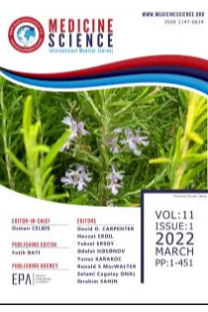The perspective of health professionals on the factor of 3rd persons in assisted reproductive techniques
___
1. Bredenoord AL, Lock MTWT, Broekmans FJM. Ethics of intergenerational (father-to-son) sperm donation. Hum Reprod. 2012;27(5):1286-91.2. Imrie S, Jadva V. The long-term experiences of surrogates: relationships and contact with surrogacy families in genetic and gestational surrogacy arrangements. Reprod Biomed Online. 2014;29(4):424–35.
3. Ergüneş S. Yapay Döllenme. Sağlık Hukuku Makaleleri II. İstanbul Barosu Yayınları, Istanbul, 2012;167-78.
4. Klitzman R. Buying and selling human eggs: infertility providers’ ethical and other concerns regarding egg donor agencies. BMC Med Ethics. 2016;17(1):71-81.
5. Boutelle AL. Donor Motivations, Associated risks and ethical considerations of oocyte donation. Nurs Womens Health. 2014;18(2):113-21.
6. Larsen EC, Petersen K, Andersen AN, Ziebe S. Egg-donation in Denmark. Ugeskr Laeger. 2009;171(39):2822-5.
7. SerreJL, Leutenegger AL, Bernheim A, Fellous M, Rouen A, Siffroi JP. Does anonymous sperm donation increase the risk for unions between relatives and the incidence of autosomal recessive diseases due to consanguinity? Hum Reprod. 2014;29(3):394-9.
8. Kılıç S, Uçar M, Türker T, Koçak N, Aydın G, Günay A, Gençtürk D.GATA Hemşirelik Yüksek Okulu öğrencilerinde taşıyıcı anneliğe yönelik tutumun belirlenmesi. Gülhane Tıp Dergisi. 2009;51:216-9.
9. Garrido N, Zuzuarregui JL, Simon C, Remohi J, Pellicer A. Sperm and oocyte donor selection and management: experience of a 10 year follow-up of more than 2100 candidates. Hum Reprod. 2002;17(2):3142-8.
10. Üremeye Yardımcı Tedavi Uygulamaları ve Üremeye Yardımcı Tedavi Merkezleri Hakkında Yönetmelik. Resmi Gazete Tarihi: 30.09.2014, Sayı: 29135.
11. Ürem M. Kadın Vücudu ve Etik Sorunlar. Sağlık Hukuku Makaleleri II. İstanbul Barosu Yayınları, 2012, ss.79-102.
12. Sydsjö G, Lampıc C, Bladh M, Svanberg AS. Oocyte and sperm donors’ opinions on the acceptable number of offspring. Acta Obstet Gynecol Scand. 2014;93(7):634-9.
13. Büyüköztürk Ş. Sosyal Bilimler için Veri Analizi El Kitabı. Ankara, Pegem A Yayıncılık, 2007.
14. Inhorn MC. Makıng muslım babıes: ıvf and gamete donatıon ın sunnı versus shı’a Islam. Cult Med Psychiatry. 2006;30(4):427-50.
15. Shreffler KM, Johnson DR, Scheuble LK. Ethical problems with infertility treatments: Attitudes and explanations. Soc Sci J. 2010;47(4):731-46.
16. Li Y, Xu HL. Ethical thinking on sperm use in human assisted reproductive technology. Zhonghua Nan Ke Xue. 2010;16(4):377-80.
17. Rubin LR, Melo-Martin I, Rosenwaks Z, Cholst IN. Once you’re choosing, nobody’s perfect: is more information necessarily better in oocyte donor selection? Reprod Biomed Online. 2015;30(3):311-8.
18. Kenney NJ, McGowam ML. Looking back: egg donors' retrospective evaluations of their motivations, expectations, and experiences during their first donation cycle. Fertil Steril. 2010;93(2):455-66.
19. Beier K. Surrogate motherhood: a trust-based approach. J Med Philos. 2015;40(6):633-52.
- ISSN: 2147-0634
- Yayın Aralığı: 4
- Başlangıç: 2012
- Yayıncı: Effect Publishing Agency ( EPA )
Managemet of puerperal vulvovaginal hematoma with different suture technique; case report
Ahmet ESER, Ahter Tanay TAYYAR, Gulhan SAGİROGLU, Çetin KILIÇÇI, Cigdem Abide YAYLA, İlter YENİDEDE
Effects of age, gender, BMI, settlement and smoking on lead and cadmium accumulation in heart tissue
Aybike DİP, Servet Birgin IRİTAS, Görkem MERGEN, Ahmet Hakan DİNÇ, Tülin SÖYLEMEZOĞLU
Apple peel atresia: a rare case of a small premature infant
The effect of vitamin B12 deficiency on the GH-IGF1 axis
BELMA HALİLOĞLU, GÜLEN TÜYSÜZ KİNTRUP, Avni KAYA
New and unusual causes of foot drop
Successful management of zinc phosphide poisoning: possible benefit of virgin olive oil
Percutaneous surgery using Admix NoKorTM Non-Coring 16 G needle in cases with trigger finger
İbrahim KURT, Ali Murat KALENDER, REŞİT SEVİMLİ, MEHMET FATİH KORKMAZ
Propolis has no effect on tendon healing: an experimental study
Engin Eren DESTELİ, Murat ERDOĞAN, Yunus İMREN, MEHMET EMİN ÖNGER
The importance of morel-lavallee lesion in medicolegal evaluation: a case report
Ahsen KAYA, Muhammed Emin GOKSEN, Ugur ATA, Ekin Özgür AKTAŞ
